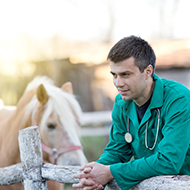Study seeks autistic farm and equine vets

Farm and equine veterinary surgeons have been underrepresented in the study so far.
A study from the University of Nottingham exploring workplace stressors affecting autistic veterinary professionals is seeking autistic farm and equine veterinary surgeons to participate.
Led by Dr Kirstie Pickles and Mr Brad Hill, the study is exploring the workplace stressors affecting autistic veterinary surgeons, with an aim to inform the design and implementation of reasonable workplace adjustments.
Dr Kirstie Pickles, lead researcher on the project, commented: “Currently, 14 vets have been interviewed for the critical incident study and common themes surrounding ‘good’ and ‘difficult’ days are beginning to emerge.
“However, farm and equine veterinary surgeon participants have been under-represented to date and, to ensure that conclusions drawn are applicable to all vets not just those in companion animal practice, we are keen to interview more large animal practitioners.”
Funded by one of the Mind Matters Initiative's Sarah Brown Mental Health Research Fund's grants, the study involves a critical incident study, interviewing autistic veterinary surgeons to identify behaviours and factors that go into a 'good' or 'difficult' day at work, and then a cross-sectional survey will be administered to the wider population of autistic veterinary surgeons to assess role-specific job stressors.
Kirstie added: “The interviews are conducted via video call on Microsoft Teams or via phone call and take approximately 30 to 40 minutes.
“The study has undergone ethical review at the University of Nottingham and all data will be anonymised and treated confidentially.”
Any veterinary surgeons interested in participating in the study should contact Kirstie at Kirstie.pickles@nottingham.ac.uk



 The Veterinary Medicines Directorate (VMD) is inviting applications from veterinary students to attend a one-week extramural studies (EMS) placement in July 2026.
The Veterinary Medicines Directorate (VMD) is inviting applications from veterinary students to attend a one-week extramural studies (EMS) placement in July 2026.